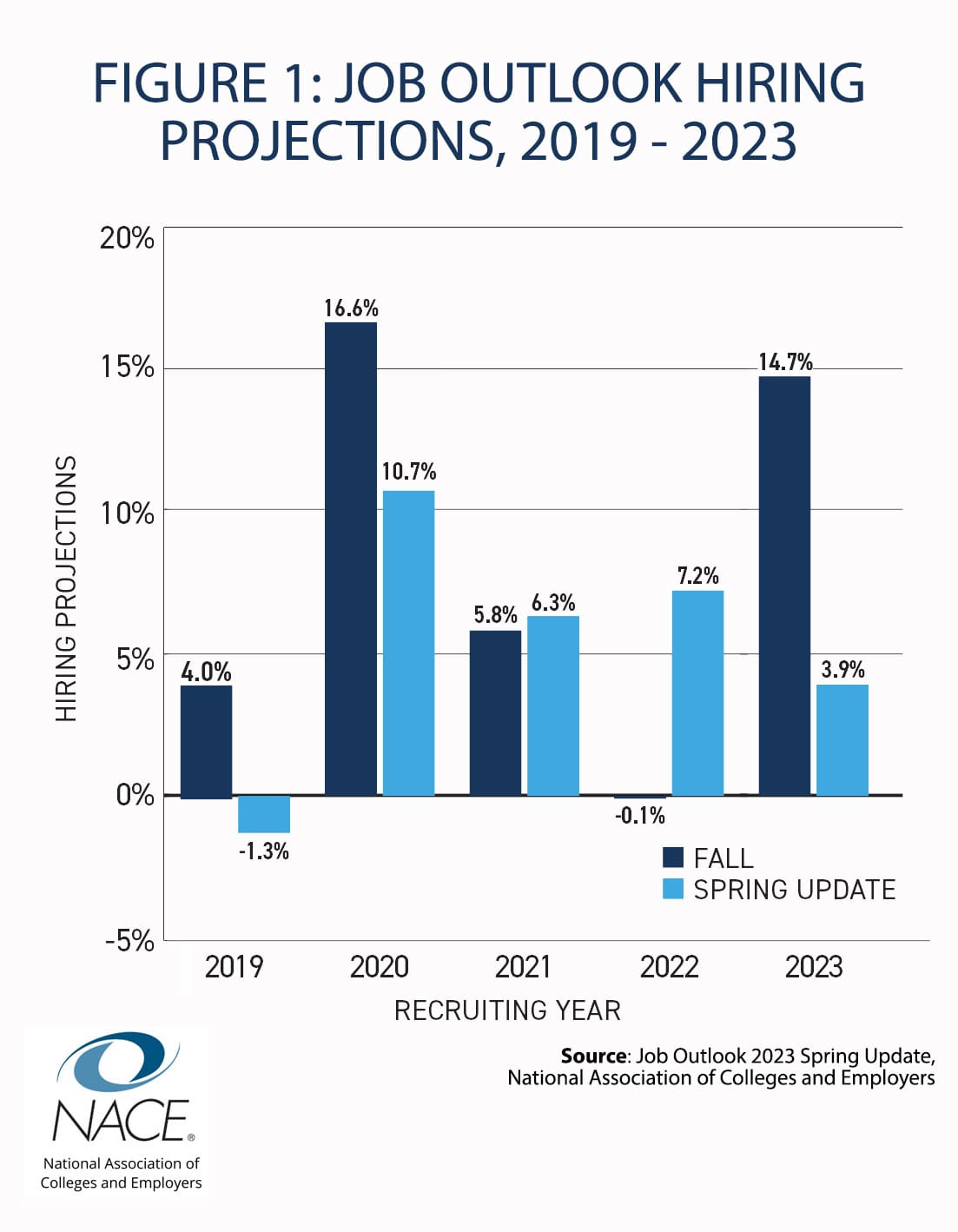- Employers plan to hire just 3.9% more college grads in 2023 than they did in 2022, according to the National Association of Colleges and Employers spring job outlook.
- Graduates can benefit from casting a wide net: Apply to a lot of jobs and be open to jobs in other industries that might be looking for your skill set.
- In a tight job market, you may also need to work on your interviewing game to land that first job.It’s almost time for the class of 2023 to take the stage, toss their hats in the air and, eventually, enter the workforce.
As if having the distinction of being the first graduating class to have been affected by Covid for all four years of their college life wasn’t enough, now they’re also graduating into a tough job market. With daily headlines about layoffs and the possibility of a recession, many employers are scaling back plans to hire new grads.
Employers plan to hire just 3.9% more college grads in 2023 than they did in 2022, according to the National Association of Colleges and Employers spring job outlook. That’s down sharply from a projection of a 14.7% hiring increase when employers were surveyed in the fall.
Some of this is due to companies that really ramped up hiring in the past few years as the economy started to recover from the pandemic, and then started to back off amid an uncertain economic outlook.
“Some industries that planned large increases in the past are cutting back on their college hires,” said Shawn VanDerziel, the executive director of NACE. “This is especially true for technology companies, which are laying off employees after hiring in large numbers during the pandemic.”
The tech industry has experienced the most layoffs of any sector — accounting for nearly 40%, of all layoffs according to Challenger, Gray & Christmas — and they’re also seeing some of the most dramatic declines in hiring new grads.

Employers in the information industry said in the fall that they expected to hire 87% more graduates than they did a year earlier. Now, they are projecting a 17% decrease in hiring. Computer electronics manufacturers are expecting to increase hiring by about 19.1%, down from an expectation of a 41% increase in the fall.
Regardless of what you majored in or what industry you are targeting, there are a few things that you can do to find that first job after college despite the tough job market.
1. Apply across different industries and locations
A lot of grads have a specific idea of what type of job they want after graduation. But you can benefit from casting a wide net: Apply to a lot of jobs and be open to jobs in other industries that might be looking for your skill set.
“Despite these shifts, this market is promising for graduates,” VanDerziel said. “And there is still ample opportunity for tech graduates to use their skills in other industries.
“For example, our Winter 2023 Salary Survey report found that two-thirds of responding employers — across industries — are planning to hire computer sciences majors from the current class. They are still in high demand,” he added.
Landing a job may come down to a numbers game.
“College seniors should be interviewing with as many companies that they can and not worry about the industry or location,” LaSalle Network CEO Tom Gimbel told CNBC.
So, how do you cast a wide net and find jobs in other industries?
Gorick Ng, a Harvard career advisor and author of “The Unspoken Rules,” recommends starting with a sector or industry (education, health care, government, insurance, etc.) or geography (Texas, New York, Colorado, etc.). Search for one of those terms plus “fastest-growing companies” or “largest companies” or “hiring” — that will help you make a list of potential employers.
Ng has also complied a list of 800 employers that have a dedicated hiring program for college students, with links to each company’s careers page. You can check it out here.
2. Figure out what skills you have that are transferrable
Everyone has transferrable skills — you just have to figure out what they are and how they would apply to other industries.
Online learning site Coursera scoured data from a variety of places such as the World Economic Forum, LinkedIn and Glassdoor, and came up with a list of the most in-demand high-income skills that are transferrable across a variety of career paths. They offer a list of those skills and then some of the jobs — and pay — you can expect to get if you have these skills. Many of the jobs have salaries of $100,000 or more.
The most in-demand high-income skills are:
- Data analysis
- Software development
- User experience
- Web development
- Project management
- Account management
- Content creation and management
So, if you have some of those skills, you might look to see what industries are seeking them. And, if you don’t have any of them, and you find yourself without a job this summer, you might consider doing some training to get a new skill.
That way, when you’re in an interview and the person asks: “What have you been doing this summer?,” you can impress them by saying that you were building out your skill set while looking for a job.
3. Work your network
When you are applying for jobs, “Don’t just aimlessly click ‘submit’ on those job applications — it’s a surefire way of throwing your resume onto a big pile that will never get looked at,” Ng said.
Instead, Ng says, reach out to people directly. That is one of the best ways to make a connection at a company — and get an interview.
Here are a few of his tips for finding them:
- Begin with your first-degree network (the people you already know — they’re labeled as 1st connections on LinkedIn). Then, try your second-degree network (people you don’t yet know but could get an introduction to because you have at least one mutual friend). Only when you’ve exhausted both of those options should you go to the third-degree network option — the cold call.
- Look up companies on LinkedIn and click “employees” to call up a list of people who work there and then filter the list for first- or second-degree contacts and so on. After that, you can clear the filter and look at everyone at the company, focusing on people who work in the department you are applying to as well as the leadership team — people with chief, director or vice president in their title. You can also go to a company’s “team” or “leadership” page.
“You are looking for people who satisfy four [the following four] criteria,” Ng said.
- They have something in common with you.
- They are senior enough that they can make hiring decisions.
- They are at an organization that is growing — and therefore hiring.
- There is some indication they are invested in young people (community service work, etc.)
“The idea is to find people who can see you as a younger version of themselves — same school, same major, same extracurriculars, same hometown, same upbringing, same identity (e.g, first-generation college student), same prior work experiences,” Ng said.
So when you find their LinkedIn page, you’re looking for “anything in their history that you can relate to,” Ng said. “The more commonalities, the better.”
Beyond searching via LinkedIn or Google, Ng says you can also dig up spreadsheet of club or sport members or even browse the alumni directory at your school.
Now that’s casting a wide net!
4. Learn how to sell yourself
In a tight job market like this, you may need to work on your interviewing game to land that first job.
Career coach Natalie Fisher, who has helped hundreds of people land six-figure jobs, said you have to go beyond statements like “I’m a great communicator” or “I have great organizational skills” and instead offer specific examples of how you are those things.
Here are three things job seekers shouldn’t say, and what to communicate instead to help you get hired:
- Don’t say: “I’m an excellent communicator.”
Instead, show them how you were able to achieve X result thanks to your Y skill. - Don’t say: “I have strong organizational skills.”
Instead, be very specific about what past managers and leaders have said they were impressed about in your work. - Don’t say: “I have great networking skills.”
Instead, explain how you have a few close friends who you have stayed in touch with — whether it was in your major, an internship or whatever — and explain how you have always tried to make them feel valued and seen. Then, explain how you will use those skills to build lasting relationships with clients, your team, etc. in this role.
So, while it’s a tough job market out there for the class of 2023, there are job opportunities. There are things you can do to be smart over the summer to find companies that are hiring college grads, build your skills, network and hone your talking points to impress the hiring manager at your next job interview.
And, a tough job market is like New York, New York, as Frank Sinatra described it: If you can make it here, you can make it anywhere!

KEY POINTS
